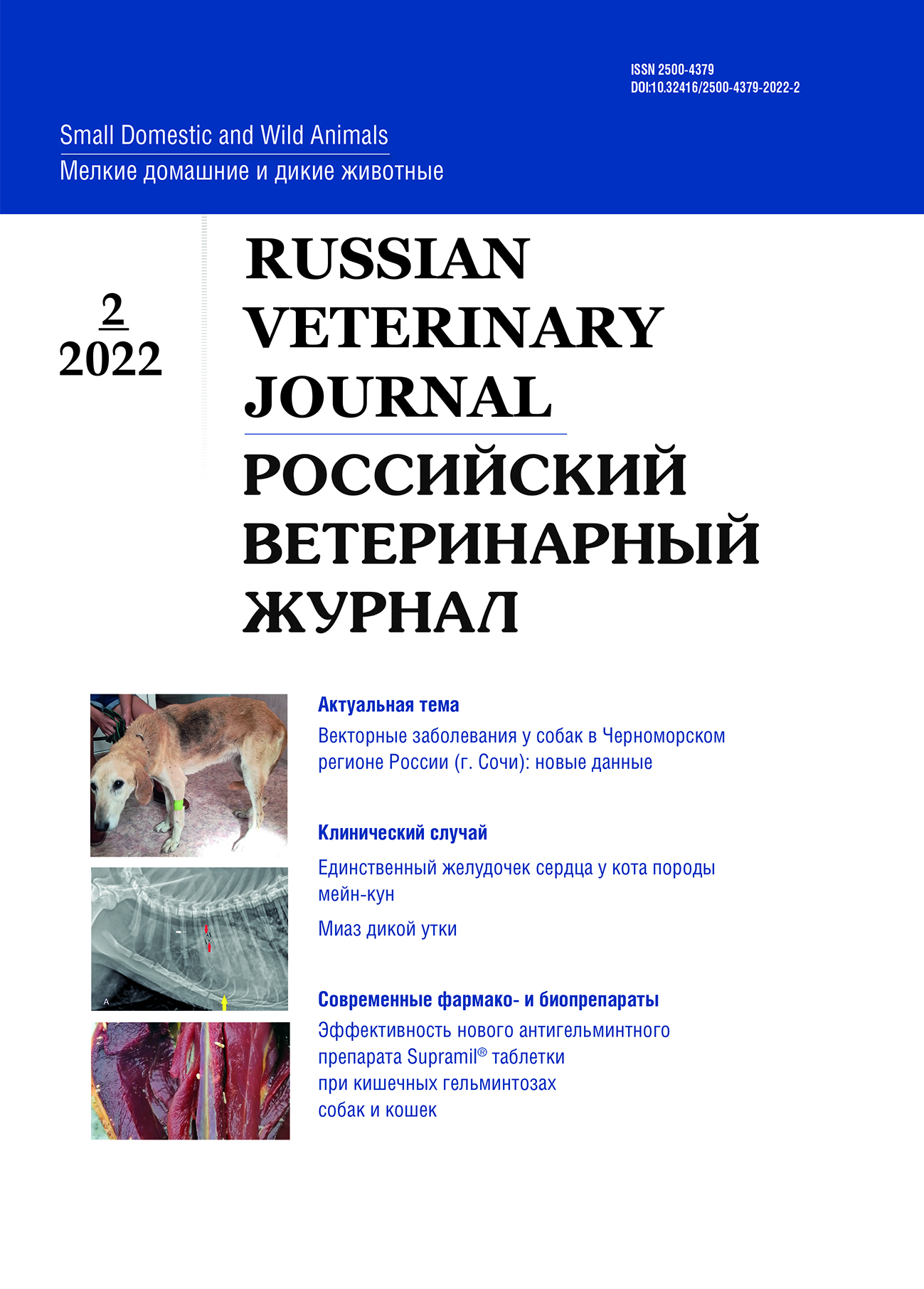from 01.01.2002 to 01.01.2022
Moscow, Moscow, Russian Federation
VAK Russia 06.02.05
CSCSTI 68.41
The paper presents a description of the case of parasitic myasis of wild gray mallard after prey on spring hunting and shows a sanitary assessment of the presented carcass. During the spring hunt of 2022, the gray mallard (Anas platyrhynchos) from the Podolsky district of the Moscow region was mined in Central Russia. Veterinary-sanitary examination, partial helminthological autopsy and trichinelloscopy of the bird carcass were carried out 3 hours after slaughter. During the study, foci of hemorrhages, neoplasms and other pathology were detected. Then, after the initial treatment of the carcass on the side and center of the keel bone, single through holes (5 visualized with the naked eye) with signs of hyperemia, local inflammation and ichorotic odor were marked on the skin surface. When cutting the skin, superficial and deep pectoral muscles in a thickness of up to 1.5 cm of carcass, viable fly larvae measuring 6-7 mm were found. After careful inspection and removal of insect larvae from host tissues, 48 specimens of the parasite were counted. There were no dystrophic and degenerative changes in the muscles and internal organs. No sarcocystosis was detected in of duck muscles. Parasitic myasis in the bird under the skin and in the thickness of the pectoral muscles developed during life. The fact of the detection of myasis in waterfowl on the past spring amateur hunts is confirmed by the hunters of the Ryazan and Tula regions. According to the rules of veterinary-sanitary examination, in case of such a lesion of wild birds with a myasis, carcasses and internal organs are subject to technical disposal.
fly larvae, sanitary assessment, duck carcass
1. Alonzo, F. Brand Gastrointestinal Myiasis - Report of a case / F. Alonzo // Archive International of Medicine. - 1931. - No. 47 (1). - rr. 149-154. doi:https://doi.org/10.1001/archinte.1931.00140190160017.
2. Shtakel'beog, A.A. Sinantropnye dvukrylye fauny SSSR / A.A. Shtakel'beog. - M.-L.: Izdatel'stvo AN SSSR, 1956. - 167 s.
3. Veselkin, G.A. O parazito-hozyaystvennyh otnosheniyah zoofil'nyh muh s domashnimi zhivotnymi, V kn. «Dvukrylye: sistematika, ekologiya, medicinskoe i veterinarnoe znachenie» / G.A. Veselkin. - S-Pb: RAN ZIN VEO, 1991. - S. 103-106.
4. Zimin, L.S. Semeystvo Muscidae. Nastoyaschie muhi (triby Muscini, Stomoxydini): Fauna SSSR. Nasekomye dvukrylye. - T. XVIII. - Vyp. 4. / L.S. Zimin. - M.-L: Izdatel'stvo AN SSSR, 1951. - 286 s.
5. Barashkova, A.I. Zoofil'nye muhi Yakutii (Obzor) / A.I. Barashkova, L.M. Budischeva // Mezhdunarodnaya nauchnaya konferenciya «Teoriya i praktika bor'by s parazitarnymi boleznyami». - M., 2020. - Vyp. 21. - S. 35-38.
6. Haliulin, Yu.G. Klinicheskoe nablyudenie furunkul'nogo miaza: diagnostika i lechenie / Yu.G. Haliulin, E.A. Pechatnikova., V.S. Akimov, D.N. Serov // Klinicheskaya dermatologiya i venerologiya. - 2020. - № 19(3). - S. 333-336.
7. Egemberdieva, R.A. Bolezni, vyzyvaemye chlenistonogimi i yadovitymi zhivotnymi / R.A. Egemberdieva, L.B. Seydulaeva, A.K. Duysenova, A.K. Shokalakova, A.A. Ergalieva // Vestnik Kazanskogo nauchno-medicinskogo universiteta. - 2017. - №2. - S. 49-52.
8. Ponamarev, N.M. Ekologicheskie i fenologicheskie osobennosti aktivnosti imago zoofil'nyh muh na territorii Altayskogo kraya / N.M. Ponamarev, N.V. Tihaya, O.E. Nosova // Vestnik Altayskogo gosudarstvennogo agrarnogo universiteta. - 2015. - № 7 (129). - S. 89-92.
9. Seregin, I.G. Veterinarno-sanitarnaya ekspertiza produktov uboya dikih promyslovyh zhivotnyh i pernatoy dichi / I.G. Seregin, A.A. Kunakov, M.F. Borovkov, V.S. Kasatkin. - M.: MGUPB, 2004. - 189 s








